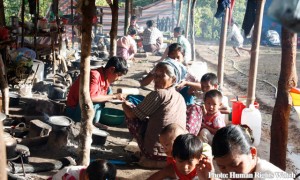Posts Tagged ‘Internally Displaced People’ (52 found)
Action Needed On Humanitarian Aid Restrictions In Burma
As Cyclone Mahasen threatens millions of people in Bangladesh and Burma, including tens of thousands of internally displaced people (IDPs) in Rakhine State, Burma Campaign UK today called on the British government and international community to take action to force President Thein Sein to allow unrestricted humanitarian aid […]
• • •Humanitarian Aid Denied
 This week’s ceasefire talks between the Kachin Independence Army (KIA) and the Burma Government are a positive step in what has been a devastating conflict rife with human rights abuses, displacement and death. While these talks have been praised by both international governments and the United Nations, there remain many obstacles to a sustainable political settlement and lasting peace.
This week’s ceasefire talks between the Kachin Independence Army (KIA) and the Burma Government are a positive step in what has been a devastating conflict rife with human rights abuses, displacement and death. While these talks have been praised by both international governments and the United Nations, there remain many obstacles to a sustainable political settlement and lasting peace.
Hostilities are still occurring and combatants continue to resupply, increasing tensions in an already frail situation. One positive step that has been taken is the allowance of aid to those in KIA-held areas affected by the conflict. Though it should be stated that the size and scope of this aid needs to conform to the needs identified on the ground and if all of those affected will receive adequate help is yet to be determined. It is estimated that over 160,000 people have been displaced over the course of fighting. These people are living in makeshift camps and without emergency aid are at great risk of humanitarian tragedy […]
Statement No. 1/2013 on Humanitarian Assistance for the Conflict Victims of the Kachin State
A four-member team of the Myanmar National Human Rights Commission (MNHRC) visited Kachin State from 8 to 10 December, 2011 for the first time in order to observe at first hand the civil population who displaced as a result of armed skirmishes […]
• • •Kachin Organization’s Statement on Thein Sein Government and Burmese Army Airstrike Attacks Against Kachin Civilians and KIO/KIA
Since June 2011, Burmese troops started war against Kachin Independence Army (KIA) as Union Solidarity and Development Party (USDP) became a government after 2010 election. Kachin Independence Organization the political wing of KIA sincerely conduct peace talk […]
• • •UN Refugee Agency Urges Calm Amid Latest Violence in Myanmar’s Rakhine State
The United Nations refugee agency has called for an immediate return to calm in western Myanmar’s Rakhine state, where ongoing inter-communal violence has uprooted more than 35,000 people […]
• • •Signs of Hope in South East Myanmar
A significant decrease in forced displacement has been documented by community‐based organisations in South East Myanmar after a series of ceasefire agreements were negotiated earlier this year. While armed conflict continues in Kachin State and communal […]
• • •Changing Realities, Poverty and Displacement in South East Burma/Myanmar
Simultaneous and interdependent reforms promoting democratisation, economic liberalisation and conflict transformation present a plethora of opportunities and risks for the people of Myanmar. The prospect of progressing from ceasefire […]
• • •New Violence in Arakan State
Human Rights Watch identified 811 destroyed structures on the eastern coastal edge of Kyauk Pyu following arson attacks reportedly conducted on October 24, 2012, less than 24 hours before the satellite images were captured. The area of destruction measures 35 acres and includes 633 buildings and 178 houseboats and floating barges adjacent on the water, all of which were razed.
• • •Destination Unknown: Hope and Doubt Regarding IDP Resettlement in Mon State
The growing optimism surrounding Burma’s political and social transitions has begun to be accompanied by ambitions to resettle displaced communities along the country’s border with Thailand. As the notion and its attendant proposals continue to proliferate, it seems timely to assess how the communities directly affected by this prospect feel about resettlement […]
• • •New Report Highlights Mon IDP Perspectives on Resettlement
This week, the Human Rights Foundation of Monland (HURFOM) released a report featuring the voices of 61 Mon internally displaced persons (IDPs) who fled from human rights violations in southern Burma, also known as Myanmar. The report analyzes testimonies regarding perspectives of resettlement and the current situation in their IDP communities, and revealed that just under half of interviewees who discussed relocation were willing to move (47%), while the others wanted to remain in their current villages (53%) […]
• • •








 All posts
All posts